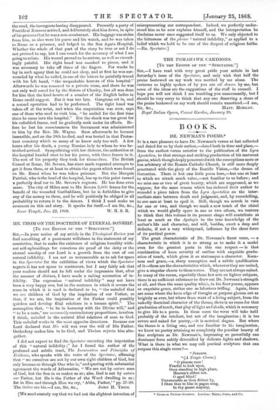MR. THOM ON THE DOCTRINE OF ETERNAL SONSHIP. [To THE
EDITOR OF THE " SPECTATOR."]
SIR,—In your notice of my article in the Theological Review you find something of a passionate wilfulness in the statement of my conviction, that to make the existence of religious humility with- out self-upbraidings for conscious sin proof of the deity or the eternal sonehip of our Lord is a growth from the root of our natural infidelity. I am not so unreasonable as to ask for space in the Spectator for the exhibition of views which the Spectator regrets it has not space to controvert, but I may fairly ask that your readers should not be left under the impression that, after the manner of divines, I have made a railing accusation of in- fidelity. The expression "natural infidelity" may not have been a very happy one, but in the sentence in which it occurs the sense in which it is used is declared to be, " the unbelief that we are children of God by the inspiration of our Father, or that, if we are, the inspiration of the Father could possibly quicken and develop filial relations in a human spirit." The assumption that, " to be in harmony with the Divine will," and " to be a man," are necessarily contradictory propositions, involves I think, unbelief in the natural filial relations of man to God. This unbelief works in the most opposite directions. Because our Lord declared that His will was ever the will of His Father. Orthodoxy makes him to be God, and Theism rejects him alto- gether.
I did not expect to find the Spectator resenting the imputation of this "natural infidelity ;" for I found the author of the profound and subtle tract, The Incarnation and Principles of Evidence, who speaks with the voice of the Spectator, affirming that " we ourselves are not by our own right children of God, but only become so through One who is," and quoting with substantial. agreement the words of Athanasias, " We are not by nature sons of God, but the Son in us makes us so ; also, God is not by nature our Father, but He is the Father of the Word dwelling in us ; for in Him and through Him we cry, ' Abba, Father,' " pp. 27-28.
The italics are am, Sir, &c., Josx H. THOM.
[We need scarcely say that we had not the slightest intention of misrepresenting our correspondent. Indeed, we perfectly under- stood him as he now explains himself, and the interpretation he disclaims never once suggested itself to us. We only objected to the bitterness of the phrase "natural infidelity," as applied to a belief which we hold to be one of the deepest of religious faiths. —En. Spectator.]






























 Previous page
Previous page